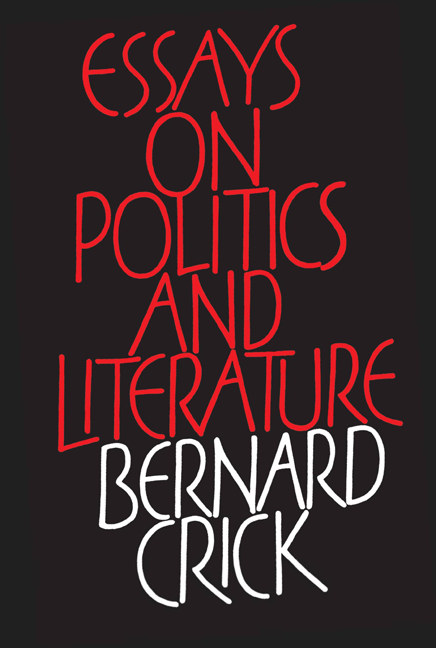Book contents
- Frontmatter
- Contents
- Preface
- Acknowledgements
- Foreword by David Daiches
- One Literature and Politics
- Two The Political in Britain’s Two National Theatres
- Three Young Writers of the Thirties
- Four Koestler’s Koestler
- Five Hannah Arendt: Hedgehog or Fox?
- Six Beatrice Webb as English Diarist
- Seven Words
- Eight My Lse
- Nine Reading The Observer as a Complex Text
- Ten On the Difficulties of Writing Biography and of Orwell’s in Particular
- Eleven Reading Nineteen Eighty-Four As Satire
- Twelve Animal Farm For Schools
- Thirteen Orwell and English Socialism
- Fourteen On the Orwell Trail
- Fifteen Wedekind’s Spring Awakening
- Sixteen Horvath’s Tales From the Vienna Woods
- Seventeen Pinter’s No Man's Land
- Eighteen Polly By Gaslight
- Nineteen Edgar Catches Jenkins’ Ear at the Barbican
- Twenty Barrault at the Barbican
- Index
Two - The Political in Britain’s Two National Theatres
Published online by Cambridge University Press: 24 September 2020
- Frontmatter
- Contents
- Preface
- Acknowledgements
- Foreword by David Daiches
- One Literature and Politics
- Two The Political in Britain’s Two National Theatres
- Three Young Writers of the Thirties
- Four Koestler’s Koestler
- Five Hannah Arendt: Hedgehog or Fox?
- Six Beatrice Webb as English Diarist
- Seven Words
- Eight My Lse
- Nine Reading The Observer as a Complex Text
- Ten On the Difficulties of Writing Biography and of Orwell’s in Particular
- Eleven Reading Nineteen Eighty-Four As Satire
- Twelve Animal Farm For Schools
- Thirteen Orwell and English Socialism
- Fourteen On the Orwell Trail
- Fifteen Wedekind’s Spring Awakening
- Sixteen Horvath’s Tales From the Vienna Woods
- Seventeen Pinter’s No Man's Land
- Eighteen Polly By Gaslight
- Nineteen Edgar Catches Jenkins’ Ear at the Barbican
- Twenty Barrault at the Barbican
- Index
Summary
The Royal Shakespeare Company, in its theatres at London and Stratford, meets the obligations of a National Theatre as comprehensively as does that national theatre on the South Bank of the Thames. These obligations were formulated in the National Theatre Committee Handbook of 1909:
(i) to keep the plays of Shakespeare in repertoire
(ii) to revive whatever else is vital in English classical drama
(iii) to prevent recent plays of great merit from falling into oblivion
(iv) to produce new plays and to further the development of modern drama
(v) to produce translations of representative works of foreign drama, ancient and modern
(vi) to stimulate the art of acting through the varied opportunities which it will offer to members of the company.
In considering the intricate relationships between drama and society in Britain in the 1970s, we will naturally regard with special interest the ways in which these heavily subsidised national institutions treat political issues.
I write as a political philosopher who happens to be an addicted theatregoer. I have reviewed some of the plays discussed here, but in conditions of relative leisure.1 Unlike newspaper reviewers, therefore, I have always been able to read the text or acting script (after the performance, on principle and also to preserve the basic dramatic joy of surprise). And unlike most literary critics, I shall limit myself here to a discussion of specific productions. The choice of plays may therefore seem rather random, but the procedure has some advantages. It should reveal how our national companies perceive politics in plays in general, rather than in the specifically ‘political’ theatre, or in drama of commitment’. One ofmy main points is that politics is important in plays which do not invite those labels.
Literary critics sometimes worry that drama is debased or simplified by intense political commitments. While this is not necessarily so, I share their worry, since political sincerity is no excuse for bad drama. Indeed I add to it a concern of my own craft: that dramatising politics in some contemporary ways can debase politics. A strident, wholly partisan view of politics expressed in one-sided dialectic is essentially undramatic.
- Type
- Chapter
- Information
- Essays on Politics and Literature , pp. 20 - 47Publisher: Edinburgh University PressPrint publication year: 2020



